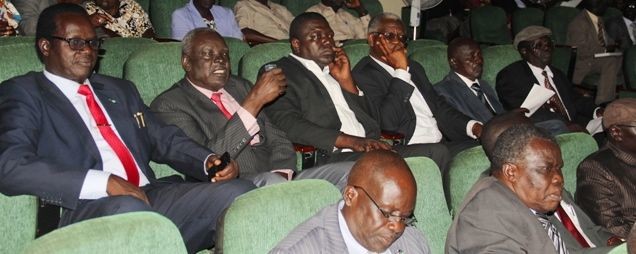Politicians and intellectuals of South Sudan’s Equatoria region met on Saturday to discuss the idea of federalism, which has been pushed by the SPLM/A-in-Opposition, but is being opposed by the vice president and other top officials.
The framers of South Sudan’s 2011 transitional constitution avoided mention of federalism, opting instead for a nominally ‘decentralized system.’ But centralization of the government’s main revenue stream and within the ruling party have helped prevent a trend toward actual decentralization.
South Sudan’s ten states now have some ‘exclusive’ executive and legislative powers, but the national government’s powers are more wide-ranging and cover most fields of governance.
Federalism is a legacy of earlier eras, however. The country used to be divided into three regions in a quasi-federal system. The three states of West, East and Central Equatoria, for example, used to be united as a single province under the Southern Provinces Regional Self-Government Act of 1972.
This law came as an outcome of the Addis Ababa Accord of that same year and also created the provinces of Bahr al Ghazal and Upper Nile.
SPLM/A-in-Opposition has announced in favor of federalism on several occasions this month, saying that the system could have prevented the current political crisis. Central Equatoria Governor Clement Wani, though not part of SPLM/A-IO, reportedly also declared in favor of federalism, saying, “the people of Equatoria have come open that this [federalism] is what should be included in the constitution.”
In a speech on Saturday, however, the highest-ranking Equatorian politician in the country, Vice President James Wani Igga, urged Equatorians not to the buy the idea of a federal system of governance.
He made the remarks while addressing a one-day Equatoria Consultative Conference in Juba on Saturday. “Many Equatorians saw that this idea of Riek on federation will rescue them. Equatorians, no, Riek is a liar. So please the few of us who think they must join Riek in order to get federation, please you are on the wrong road,” Igga said.
The one-day conference aimed to discuss the idea of a federal system of governance, permanent constitution, and the judiciary system in South Sudan.
“This federation here is not the creation of Riek, we all know that Riek actually stole this renewed call for federalism in this hall here – Nyakuron – during a Equatorian Consultative Conference like this, because he knew the resolutions of it then he said yes, I am also for federation,” Igga said.
The Equatoria Consultative Conference was held at Nyakuron Cultural Center and was attended by the Governor of Central Equatoria, representatives of the two governors of Western and Eastern Equatoria and other officials, and MPs at both state and national level.
Soon after the vice president’s remarks, a high-ranking state government official warned journalists not to report on the speech of the vice president, saying it did not constitute part of the conference.
Meanwhile, in an interview last week an Equatorian member of SPLM/A-in-Opposition, Oyet Nathaniel Pierino, said a federal system of governance could address the issue of diversity and accelerate development in South Sudan.
Oyet said the problems which led to the crisis in South Sudan were lack of separation of powers, checks and balances and development of independent legal and judicial branches.
Critics of the federalism idea view it as a path toward fragmentation of the country into tribal regions. Some pointed to the recent series of Equatorian regional conferences as a resurgence of kokora – a term referring to Equatorian particularism.
Photo: State ministers and MPs at the on-day Equatoria coneference
Gallery 1: Vice President James Wani addresses the conference
Gallery 2: CES Governor Clement Wani (right)




